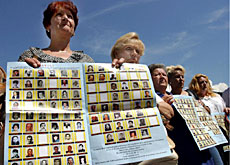
Team seeks blood samples to identify war victims

A team of forensic scientists is visiting Switzerland in a bid to track down relatives of unidentified victims of the wars in the former Yugoslavia.
The team from the International Commission on Missing Persons (ICMP) is using a genetic identification test pioneered partly in Switzerland.
Thomas Krompecher, director of Lausanne University’s institute for forensic science and a member of the ICMP’s scientific advisory board, told swissinfo that team members would collect blood samples from former Yugoslav nationals living in Switzerland.
These samples would then be subjected to laboratory DNA tests and the results compared with bone tissue from unidentified war victims.
“The war in the former Yugoslavia left between 20,000 and 30,000 unidentified victims of ethnic cleansing,” said Krompecher.
“This method is extremely expensive and complex, but it is the only way to identify bodies that are really nothing more than skeletons.”
At the end of 2002, there were nearly 365,000 people from the former Yugoslav republics living in Switzerland.
Genetic match
Krompecher, who helped develop the test in 2000, said it was based on building genetic profiles of the living and the dead.
The two profiles are then compared using computer programmes to determine whether there are any genetic links between the two.
The ICMP said it was also looking to remind people that there are still large numbers of unidentified bodies in the former Yugoslavia.
The organisation hopes to persuade families that donating a blood sample could enable identification of missing relatives.
“We are appealing to people who might be living in Switzerland now and have relatives missing to contact one of our team members,” Asta Zinbo, the ICMP’s director of civil society initiatives, told swissinfo.
“We know that there are a comparatively large number of people from the region now living in Switzerland, particularly from the areas with high numbers of missing persons.”
Public presentations are being organised in Zurich, Lucerne, Geneva, Lausanne/Yverdon and Neuchâtel.
International initiative
The team members from Pristina in Kosovo and Sarajevo in Bosnia-Herzegovina expect to take at least 500 blood samples in Switzerland.
Prior contact has already been made with around 1,500 former Yugoslav nationals, in particular refugees from the Bosnian conflict.
ICMP members are also visiting five other European countries: Austria, Denmark, Germany, the Netherlands and Slovenia.
The ICMP is an independent intergovernmental association which was set up in 1996 to address the issue of people missing from the wars in Bosnia-Herzegovina, Croatia and Serbia-Montenegro from 1991 to 1995.
Following the conflict in Kosovo in 1999 and the crisis in Macedonia in 2001, the ICMP expanded its operations to address missing person cases in these areas.
The organisation estimates that more than 25,000 victims of the conflicts in the former Yugoslavia remain unidentified, of whom about 20,000 are in Bosnia.
It is estimated that the wars in the former Yugoslav republics left 350,000 people dead and saw 3.5 million driven from their homes.
swissinfo
There are roughly 365,000 people from the former Yugoslav republics living in Switzerland.
The wars that tore apart the region during the 1990s cost 350,000 lives and saw around 3.5 million driven from their homes.
Anyone wishing to contact a member of the Swiss team should phone: 00387 61 809 103.
The ICMP team is visiting six European countries, including Switzerland, to track down living relatives of unidentified victims from the wars in the former Yugoslavia.
They are using a method based on DNA analysis of blood samples, which was pioneered partly in Switzerland.

In compliance with the JTI standards
More: SWI swissinfo.ch certified by the Journalism Trust Initiative


























You can find an overview of ongoing debates with our journalists here . Please join us!
If you want to start a conversation about a topic raised in this article or want to report factual errors, email us at english@swissinfo.ch.